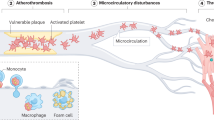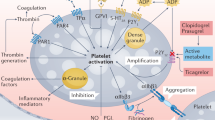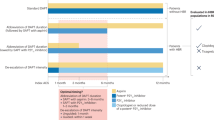Abstract
Antiplatelet drug therapy has become one of the cornerstones of treatment for patients with cardiovascular disease. Large clinical trials have shown that antiplatelet medications have important clinical benefits and prevent adverse outcomes in patients with coronary artery disease. Recurrent adverse cardiovascular events still occur in a substantial proportion of patients on standard dual antiplatelet therapy, however, which has been attributed to nonresponsiveness to this treatment. Both pharmacological and pharmacokinetc mechanisms are involved in variability in responsiveness to antiplatelet agents, and include drug bioavailability, medication noncompliance, drug–drug interactions, cytochrome P450 activity, and genetic polymorphisms. Numerous observational studies have consistently shown an association between antiplatelet drug nonresponsiveness and adverse clinical outcomes. However, these studies are limited by varying antiplatelet drug dosing regimens, heterogeneous laboratory assessments for ex vivo platelet function, and wide interindividual variation in platelet responses. Only within the last 2 years have randomized clinical trials indicated that increased dosing with antiplatelet drugs could reduce adverse clinical outcomes. Nonetheless, large clinical trials with standardized laboratory methods and well-defined protocols are needed that will definitively determine the association between antiplatelet drug nonresponsiveness and clinical events, and establish therapeutic strategies to overcome blunted antiplatelet effects.
Key Points
-
Antiplatelet drugs are an established therapy for patients with cardiovascular disease, particularly for the prevention of cardiovascular events in those undergoing percutaneous coronary intervention with stenting
-
Some patients consistently demonstrate a diminished platelet response to these agents when measured by multiple ex vivo methods
-
Medication noncompliance, antiplatelet drug bioavailability, drug–drug interactions, genetic polymorphisms, inconsistent dosing, and nonstandardized laboratory tests have challenged the concept that ex vivo assessment of antiplatelet responses can predict clinical outcomes
-
Evidence has emerged that patients with intact platelet responsiveness while on antiplatelet therapy are at risk for future cardiovascular events
-
A challenge for the future will be the prompt identification of patients with reduced platelet responsiveness, so that therapy can be initiated to overcome this effect and improve clinical outcomes
This is a preview of subscription content, access via your institution
Access options
Subscribe to this journal
Receive 12 print issues and online access
$209.00 per year
only $17.42 per issue
Buy this article
- Purchase on Springer Link
- Instant access to full article PDF
Prices may be subject to local taxes which are calculated during checkout



Similar content being viewed by others
References
Fuster, V. et al. Atherosclerotic plaque rupture and thrombosis. Evolving concepts. Circulation 82 (Suppl), II47–II59 (1990).
Fuster, V. et al. The pathogenesis of coronary artery disease and the acute coronary syndromes (1). N. Engl. J. Med. 326, 242–250 (1992).
Topol, E. J. Toward a new frontier in myocardial reperfusion therapy: emerging platelet preeminence. Circulation 97, 211–218 (1998).
Samara, W. M. & Gurbel, P. A. The role of platelet receptors and adhesion molecules in coronary artery disease. Coronary Artery Dis. 14, 65–79 (2003).
Yusuf, S. et al. Effects of clopidogrel in addition to aspirin in patients with acute coronary syndromes without ST-segment elevation. N. Engl. J. Med. 345, 494–502 (2001).
Mehta, S. R. et al. Effects of pretreatment with clopidogrel and aspirin followed by long-term therapy in patients undergoing percutaneous coronary intervention: the PCI-CURE study. Lancet 358, 527–533 (2001).
Steinhubl, S. R. et al. Early and sustained dual oral antiplatelet therapy following percutaneous coronary intervention: a randomized controlled trial. JAMA 288, 2411–2420 (2002).
Gurbel, P. A. et al. Platelet reactivity in patients and recurrent events post-stenting: results of the PREPARE Post-Stenting Study. J. Am. Coll. Cardiol. 46, 1820–1826 (2005).
Singh, M. et al. Geographical differences in the rates of angiographic restenosis and ischemia-driven target vessel revascularization after percutaneous coronary interventions: results from the Prevention of Restenosis With Tranilast and its Outcomes (PRESTO) Trial. J. Am. Coll. Cardiol. 47, 34–39 (2006).
Maree, A. O. & Fitzgerald, D. J. Variable platelet response to aspirin and clopidogrel in atherothrombotic disease. Circulation 115, 2196–2207 (2007).
Quick, A. J. Salicylates and bleeding: the aspirin tolerance test. Am. J. Med. Sci. 252, 265–269 (1966).
Wiviott, S. D. et al. Prasugrel versus clopidogrel in patients with acute coronary syndromes. N. Engl. J. Med. 357, 2001–2015 (2007).
Bonello, L. et al. Adjusted clopidogrel loading doses according to vasodilator-stimulated phosphoprotein phosphorylation index decrease rate of major adverse cardiovascular events in patients with clopidogrel resistance: a multicenter randomized prospective study. J. Am. Coll. Cardiol. 51, 1404–1411 (2008).
Jack, D. B. One hundred years of aspirin. Lancet 350, 437–439 (1997).
[No authors listed] Collaborative meta-analysis of randomised trials of antiplatelet therapy for prevention of death, myocardial infarction, and stroke in high risk patients. BMJ 324, 71–86 (2002).
Berenbaum, F. COX-3: fact or fancy? Joint Bone Spine 71, 451–453 (2004).
Fitzgerald, D. J. & Maree, A. Aspirin and clopidogrel resistance. In Hematol. Am. Soc. Hematol. Educ. Progr, 2007 114–120 (2007).
Maree, A. O. & Fitzgerald, D. J. Aspirin and coronary artery disease. Thromb. Haemost. 92, 1175–1181 (2004).
Cattaneo, M. Laboratory detection of 'aspirin resistance': what test should we use (if any)? Eur. Heart J. 28, 1673–1675 (2007).
Gonzalez-Conejero, R. et al. Biological assessment of aspirin efficacy on healthy individuals: heterogeneous response or aspirin failure? Stroke 36, 276–280 (2005).
Gurbel, P., Becker, R. C., Mann, K. G., Steinhubl, S. R. & Michelson, A. D. Platelet function monitoring in patients with coronary artery disease. J. Am. Coll. Cardiol. 50, 1822–1834 (2007).
Lordkipanidze, M. et al. A comparison of six major platelet function tests to determine the prevalence of aspirin resistance in patients with stable coronary artery disease. Eur. Heart J. 28, 1702–1708 (2007).
Hovens, M. M. et al. Prevalence of persistent platelet reactivity despite use of aspirin: a systematic review. Am. Heart J. 153, 175–181 (2007).
Zimmermann, N. et al. Functional and biochemical evaluation of platelet aspirin resistance after coronary artery bypass surgery. Circulation 108, 542–547 (2003).
Maree, A. O. et al. Growth arrest specific gene (GAS) 6 modulates platelet thrombus formation and vascular wall homeostasis and represents an attractive drug target. Curr. Pharm. Des. 13, 2656–2661 (2007).
Weber, A. A. et al. Towards a definition of aspirin resistance: a typological approach. Platelets 13, 37–40 (2002).
Winocour, P. D. Platelet turnover in advanced diabetes. Eur. J. Clin. Invest. 24 (Suppl. 1), 34–37 (1994).
Davi, G. et al. Diabetes mellitus, hypercholesterolemia, and hypertension but not vascular disease per se are associated with persistent platelet activation in vivo. Evidence derived from the study of peripheral arterial disease. Circulation 96, 69–75 (1997).
Vejar, M. et al. Dissociation of platelet activation and spontaneous myocardial ischemia in unstable angina. Thromb. Haemost. 63, 163–168 (1990).
Cipollone, F. et al. Oxidant stress and aspirin-insensitive thromboxane biosynthesis in severe unstable angina. Circulation 102, 1007–1013 (2000).
Feher, G., Feher, A., Pusch, G., Lupkovics, G., Szapary, L. & Papp, E. The genetics of antiplatelet drug resistance. Clin. Genet. 75, 1–18 (2009).
Maree, A. O. et al. Cyclooxygenase-1 haplotype modulates platelet response to aspirin. J. Thromb. Haemost. 3, 2340–2345 (2005).
Macchi, L. et al. Resistance in vitro to low-dose aspirin is associated with platelet PlA1 (GP IIIa) polymorphism but not with C807T(GP Ia/IIa) and C-5T Kozak (GP Ibalpha) polymorphisms. J. Am. Coll. Cardiol. 42, 1115–1119 (2003).
Rao, G. H. et al. Ibuprofen protects platelet cyclooxygenase from irreversible inhibition by aspirin. Arteriosclerosis 3, 383–388 (1983).
Catella-Lawson, F. et al. Cyclooxygenase inhibitors and the antiplatelet effects of aspirin. N. Engl. J. Med. 345, 1809–1817 (2001).
Cox, D. et al. Effect of enteric coating on antiplatelet activity of low-dose aspirin in healthy volunteers. Stroke 37, 2153–2158 (2006).
Kulkarni, S. P. et al. Long-term adherence with cardiovascular drug regimens. Am. Heart J. 151, 185–191 (2006).
Biondi-Zoccai, G. G. et al. A systematic review and meta-analysis on the hazards of discontinuing or not adhering to aspirin among 50,279 patients at risk for coronary artery disease. Eur. Heart J. 27, 2667–2674 (2006).
Alberts, M. J. et al. Antiplatelet effect of aspirin in patients with cerebrovascular disease. Stroke 35, 175–178 (2004).
Grotemeyer, K. H., Scharafinski, H. W. & Husstedt, I. W. Two-year follow-up of aspirin responder and aspirin nonresponder. A pilot study including 180 post-stroke patients. Thromb. Res. 71, 397–403 (1993).
Snoep, J. D. et al. Association of laboratory-defined aspirin resistance with a higher risk of recurrent cardiovascular events: a systematic review and meta-analysis. Arch. Intern. Med. 167, 1593–1599 (2007).
Gurbel, P. A. et al. Evaluation of dose-related effects of aspirin on platelet function: results from the Aspirin-Induced Platelet Effect (ASPECT) study. Circulation 115, 3156–3164 (2007).
De Miguel, A., Ibanez, B. & Badimon, J. J. Clinical implications of clopidogrel resistance. Thromb. Haemost. 100, 196–203 (2008).
Savi, P. et al. The antiaggregating activity of clopidogrel is due to a metabolic activation by the hepatic cytochrome P450–451A. Thromb. Haemost. 72, 313–317 (1994).
Järemo, P., Lindahl, T. L., Fransson, S. G. & Richter, A. J. Individual variations of platelet inhibition after loading doses of clopidogrel. J. Intern. Med. 252, 233–238 (2002).
Serebruany, V. et al. Variability in platelet responsiveness to clopidogrel among 544 individuals. J. Am. Coll. Cardiol. 45, 246–251 (2005).
O'Donoghue, M. & Wiviott, S. D. Clopidogrel response variability and future therapies: clopidogrel: does one size fit all? Circulation 114, e600–e606 (2006).
Michelson, A. D. Platelet function testing in cardiovascular diseases. Circulation 110, e489–e493 (2004).
Farid, N. A. et al. Cytochrome P450 3A inhibition by ketoconazole affects prasugrel and clopidogrel pharmacokinetics and pharmacodynamics differently. Clin. Pharmacol. Ther. 81, 735–741 (2007).
Lau, W. C. et al. Contribution of hepatic cytochrome P450 3A4 metabolic activity to the phenomenon of clopidogrel resistance. Circulation 109, 166–171 (2004).
Lau, W. C. et al. Atorvastatin reduces the ability of clopidogrel to inhibit platelet aggregation: a new drug–drug interaction. Circulation 107, 32–37 (2003).
Gilard, M. et al. Influence of omeprazole on the antiplatelet action of clopidogrel associated with aspirin: the randomized, double-blind OCLA (Omeprazole Clopidogrel Aspirin) study. J. Am. Coll. Cardiol. 51, 256–260 (2008).
Angiolillo, D. J. et al. Contribution of gene sequence variations of the hepatic cytochrome P450 3A4 enzyme to variability in individual responsiveness to clopidogrel. Arterioscler. Thromb. Vasc. Biol. 26, 1895–1900 (2006).
Beer, J. H., S. Pederiva & Pontiggia, L. Genetics of platelet receptor single-nucleotide polymorphisms: clinical implications in thrombosis. Ann. Med. 32 (Suppl. 1), 10–14 (2000).
Collet J. P. et al. Cytochrome P450 2C19 polymorphism in young patients treated with clopidogrel after myocardial infarction: a cohort study. Lancet 373, 309–317 (2009).
Mega, J. L. et al. Cytochrome P450 polymorphisms and response to clopidogrel. N. Engl. J. Med. 360, 354–362 (2009).
Spertus, J. A. et al. Prevalence, predictors, and outcomes of premature discontinuation of thienopyridine therapy after drug-eluting stent placement: results from the PREMIER registry. Circulation 113, 2803–2809 (2006).
Hamann, G. F. et al. Adherence to secondary stroke prevention strategies—results from the German Stroke Data Bank. Cerebrovasc. Dis. 15, 282–288 (2003).
Gurbel, P. A. et al. Clopidogrel loading with eptifibatide to arrest the reactivity of platelets: results of the Clopidogrel Loading With Eptifibatide to Arrest the Reactivity of Platelets (CLEAR PLATELETS) study. Circulation 111, 1153–1159 (2005).
Muller, I. et al. Effect of a high loading dose of clopidogrel on platelet function in patients undergoing coronary stent placement. Heart 85, 92–93 (2001).
Smith, S. C., Jr. et al. ACC/AHA/SCAI Guideline update for percutaneous coronary intervention—summary article: a report of the American College of Cardiology/American Heart Association Task Force on Practice Guidelines (ACC/AHA/SCAI Writing Committee to Update the 2001 Guidelines for Percutaneous Coronary Intervention). Circulation 113, 156–175 (2005).
Serebruany, V. L. The “clopidogrel resistance” trap. Am. J. Cardiol. 100, 1044–1046 (2007).
Mani, H. et al. Determination of clopidogrel main metabolite in plasma: a useful tool for monitoring therapy? Ther. Drug. Monit. 30, 84–89 (2008).
von Beckerath, N. et al. Absorption, metabolization, and antiplatelet effects of 300-, 600-, and 900-mg loading doses of clopidogrel: results of the ISAR-CHOICE (Intracoronary Stenting and Antithrombotic Regimen: Choose Between 3 High Oral Doses for Immediate Clopidogrel Effect) Trial. Circulation 112, 2946–2950 (2005).
Gurbel, P. A. et al. Clopidogrel for coronary stenting: response variability, drug resistance, and the effect of pretreatment platelet reactivity. Circulation 107, 2908–2913 (2003).
Steinhubl, S. R. et al. Point-of-care measured platelet inhibition correlates with a reduced risk of an adverse cardiac event after percutaneous coronary intervention: results of the GOLD (AU-Assessing Ultegra) multicenter study. Circulation 103, 2572–2578 (2001).
Muller, I. et al. Prevalence of clopidogrel non-responders among patients with stable angina pectoris scheduled for elective coronary stent placement. Thromb. Haemost. 89, 783–787 (2003).
Buonamici, P. et al. Impact of platelet reactivity after clopidogrel administration on drug-eluting stent thrombosis. J. Am. Coll. Cardiol. 49, 2312–2317 (2007).
Horstrup, K. et al. Phosphorylation of focal adhesion vasodilator-stimulated phosphoprotein at Ser157 in intact human platelets correlates with fibrinogen receptor inhibition. Eur. J. Biochem. 225, 21–27 (1994).
Gurbel, P. A. & Tantry, U. S. Clopidogrel resistance? Thromb. Res. 120, 311–321 (2007).
Barragan, P. et al. Resistance to thienopyridines: clinical detection of coronary stent thrombosis by monitoring of vasodilator-stimulated phosphoprotein phosphorylation. Cathet. Cardiovasc. Interv. 59, 295–302 (2003).
Cattaneo, M. Aspirin and clopidogrel: efficacy, safety, and the issue of drug resistance. Arterioscler. Thromb. Vasc. Biol. 24, 1980–1987 (2004).
Nguyen, T. A., Diodati J. G. & Pharand, C. Resistance to clopidogrel: a review of the evidence. J. Am. Coll. Cardiol. 45, 1157–1164 (2005).
Gori, A. M. et al. Incidence and clinical impact of dual nonresponsiveness to aspirin and clopidogrel in patients with drug-eluting stents. J. Am. Coll. Cardiol. 52, 734–739 (2008).
Eikelboom, J. W. et al. Aspirin-resistant thromboxane biosynthesis and the risk of myocardial infarction, stroke, or cardiovascular death in patients at high risk for cardiovascular events. Circulation 105, 1650–1655 (2002).
Gum, P. A. et al. A prospective, blinded determination of the natural history of aspirin resistance among stable patients with cardiovascular disease. J. Am. Coll. Cardiol. 41, 961–965 (2003).
Cotter, G. et al. Lack of aspirin effect: aspirin resistance or resistance to taking aspirin? Am. Heart J. 147, 293–300 (2004).
Pamukcu, B. et al. The role of aspirin resistance on outcome in patients with acute coronary syndrome and the effect of clopidogrel therapy in the prevention of major cardiovascular events. J. Thromb. Thrombolysis 22, 103–110 (2006).
Stejskal, D. et al. Aspirin resistance measured by cationic propyl gallate platelet aggregometry and recurrent cardiovascular events during 4 years of follow-up. Eur. J. Intern. Med. 17, 349–354 (2006).
Matetzky, S. et al. Clopidogrel resistance is associated with increased risk of recurrent atherothrombotic events in patients with acute myocardial infarction. Circulation 109, 3171–3175 (2004).
Lev, E. I. et al. Aspirin and clopidogrel drug response in patients undergoing percutaneous coronary intervention: the role of dual drug resistance. J. Am. Coll. Cardiol. 47, 27–33 (2006).
Bliden, K. P. et al. Increased risk in patients with high platelet aggregation receiving chronic clopidogrel therapy undergoing percutaneous coronary intervention: is the current antiplatelet therapy adequate? J. Am. Coll. Cardiol. 49, 657–666 (2007).
Ajzenberg, N. et al. Enhanced shear-induced platelet aggregation in patients who experience subacute stent thrombosis: a case–control study. J. Am. Coll. Cardiol. 45, 1753–1756 (2005).
Geisler, T. et al. Low response to clopidogrel is associated with cardiovascular outcome after coronary stent implantation. Eur. Heart J. 27, 2420–2425 (2006).
Gurbel, P. A. et al. Clopidogrel effect on platelet reactivity in patients with stent thrombosis: results of the CREST Study. J. Am. Coll. Cardiol. 46, 1827–1832 (2005).
Cuisset, T. et al. High post-treatment platelet reactivity identified low-responders to dual antiplatelet therapy at increased risk of recurrent cardiovascular events after stenting for acute coronary syndrome. J. Thromb. Haemost. 4, 542–549 (2006).
Hochholzer, W. et al. Impact of the degree of peri-interventional platelet inhibition after loading with clopidogrel on early clinical outcome of elective coronary stent placement. J. Am. Coll. Cardiol. 48, 1742–1750 (2006).
Patti, G. et al. Point-of-care measurement of clopidogrel responsiveness predicts clinical outcome in patients undergoing percutaneous coronary intervention results of the ARMYDA-PRO (Antiplatelet therapy for Reduction of Myocardial Damage during Angioplasty-Platelet Reactivity Predicts Outcome) study. J. Am. Coll. Cardiol. 52, 1128–1133 (2008).
Marcucci, R. et al. Cardiovascular death and nonfatal myocardial infarction in acute coronary syndrome patients receiving coronary stenting are predicted by residual platelet reactivity to ADP detected by a point-of-care Assay: a 12-month follow-up. Circulation 119, 237–242 (2009).
Author information
Authors and Affiliations
Corresponding author
Ethics declarations
Competing interests
The authors declare no competing financial interests.
Rights and permissions
About this article
Cite this article
Sweeny, J., Gorog, D. & Fuster, V. Antiplatelet drug 'resistance'. Part 1: mechanisms and clinical measurements. Nat Rev Cardiol 6, 273–282 (2009). https://doi.org/10.1038/nrcardio.2009.10
Issue Date:
DOI: https://doi.org/10.1038/nrcardio.2009.10
This article is cited by
-
Insights into platelet pharmacology from a cryo-EM structure of the ABCC4 transporter
Nature Cardiovascular Research (2023)
-
Point-of-care platelet function tests: relevance to arterial thrombosis and opportunities for improvement
Journal of Thrombosis and Thrombolysis (2021)
-
Effect of palm-based tocotrienols and tocopherol mixture supplementation on platelet aggregation in subjects with metabolic syndrome: a randomised controlled trial
Scientific Reports (2017)
-
PAR-1 antagonist vorapaxar favorably improves global thrombotic status in patients with coronary disease
Journal of Thrombosis and Thrombolysis (2014)
-
Development of a perfusion chamber assay to study in real time the kinetics of thrombosis and the antithrombotic characteristics of antiplatelet drugs
Thrombosis Journal (2012)



